Pine Bluff Transitional Care Ratings and Violations
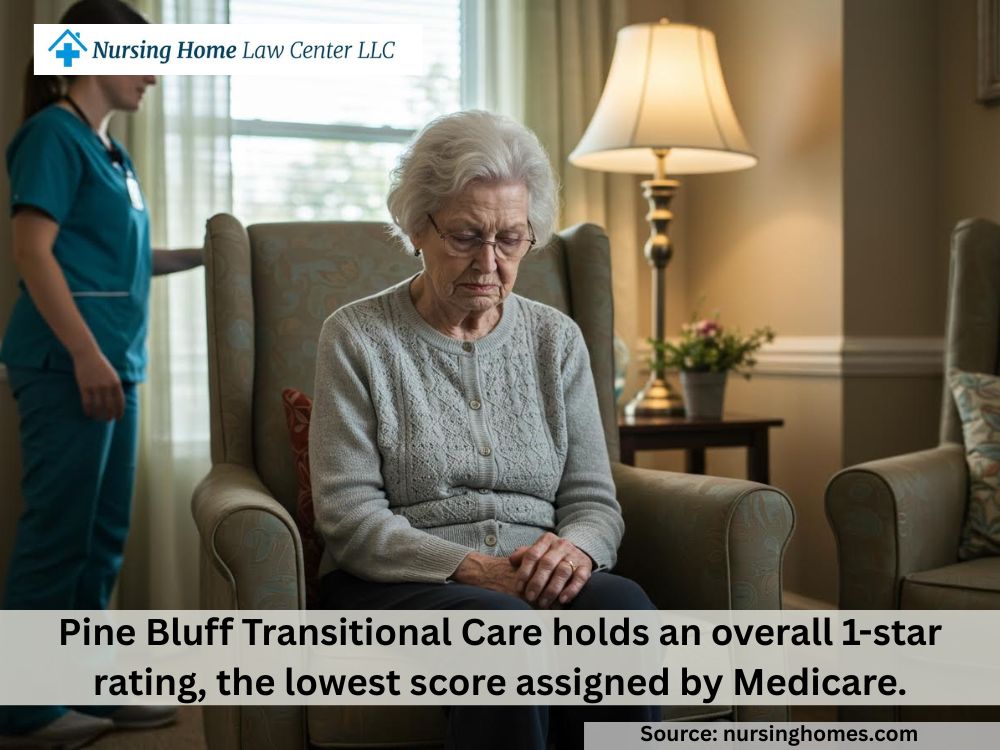
Nursing homes in the United States are vital for caring for older adults with medical needs. These facilities provide safe, comfortable, and supportive environments for residents, enabling them to maintain a high quality of life as they age. However, many nursing facilities, including Pine Bluff Transitional Care in Arkansas, struggle to meet expected standards of care. When these deficiencies occur, residents may be exposed to abuse or neglect.
At the Nursing Home Law Center, we understand the challenges residents and families face when they have suffered from misconduct in a skilled nursing facility. Our dedicated nursing home abuse attorneys will stand by your side and guide you through the claims process to increase your chances of winning a lawsuit. We have helped many abuse and neglect survivors secure compensation for legal damages while holding the at-fault parties accountable.
In this guide, we will take a detailed look at this facility’s past, which includes many violations and quality issues. Then, we will discuss the legal options a victim can leverage to pursue justice against the offending institution.
Pine Bluff Transitional Care: Skilled Nursing Facility Profile
The Centers for Medicare & Medicaid Services (CMS) is a federal agency that regulates nursing homes in the United States. This organization performs inspections, publishes quality ratings, and lists location data for all qualified institutions in the country. This information helps consumers assess the quality of various facilities to make the best decisions for their needs.
Here is some of the latest data available about Pine Bluff Transitional Care:
Facility Name: Pine Bluff Nursing LLC
Address: 6810 South Hazel Street, Pine Bluff, AR 71603
CMS Overall Rating: 1 star (much below average)
CMS Health Inspection Rating: 1 star (much below average)
CMS Staffing Rating: 2 stars (below average)
CMS Quality Measures Rating: 2 stars (below average)
Federal Fines in the Last 3 Years: 5 fines totaling $34,404
Denied Payments by Medicare in the Last 3 Years: 0 payment denials
Cited for Abuse: No
SFF: No
About Pine Bluff Transitional Care
Pine Bluff Transitional Care is a skilled nursing facility in Arkansas that provides post-acute services, short-term rehabilitation, and long-term care for its residents. This institution is owned by a non-profit business called Global Healthcare REIT, a major nursing home ownership group in the United States. It has 63 certified beds and accepts both Medicare and Medicaid. It is not part of a continuing care retirement community or a hospital.
Residents at Pine Bluff have access to the following services:
- Short-term rehabilitation programs
- Physical, occupational, and speech therapy
- Daily living assistance (eating, bathing, dressing, etc.)
- Social, physical, and recreational activities
- Semi-private rooms
- 24/7 nursing care
- Wound care
- Pain management
- Nutritional support
- Medication management
- Individualized care plans
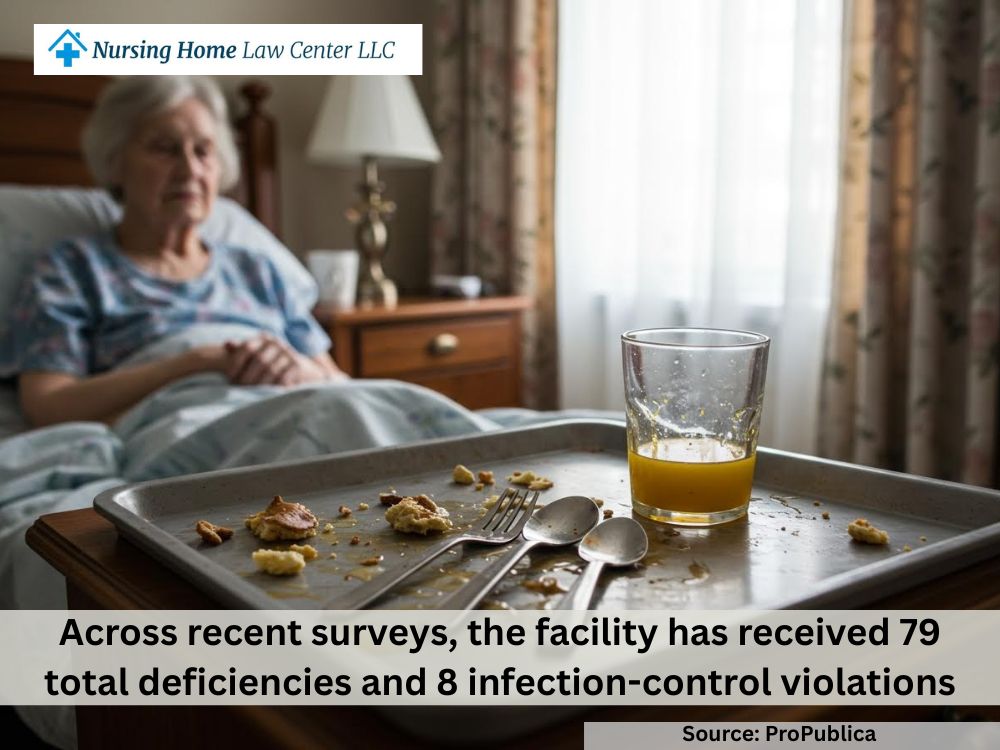
Pine Bluff Transitional Care CMS Ratings, Violations, and Safety Inspections
One of CMS’s important duties is rating each nursing home in the United States. CMs created a five-star scoring system that rates three categories at every facility: health inspections, staffing, and quality measures. Together, scores in these three categories contribute to a fourth, overall rating for the institution. The scale for this rating system is as follows:
- One star – Much below average
- Two stars – Below average
- Three stars – Average
- Four stars – Above average
- Five stars – Much above average
Based on this system, Pine Bluff Transitional Care scored rather poorly in all categories. It is considered much below average for health inspections and its overall score. In staffing and quality measures, it received only two stars, which is still below average. In the following sections, we will examine the three categories of CMS ratings to understand the reasoning behind the poor scores at this nursing home, which has been designated a special focus facility candidate due to repeated deficiencies.
Special Focus Facility Health Inspections
This nursing institution received the lowest possible health inspection rating. Inspections are a regular part of a nursing home’s schedule, often being conducted annually. However, if there are complaints against a facility, an additional inspection may be scheduled.
The most recent inspection at Pine Bluff was conducted in October 2024. This inspection reported 36 health citations, far exceeding the state average of 6.5 and the national average of 9.5 citations per inspection, making Pine Bluff one of the worst nursing homes in Arkansas. Since July 2024, two inspections have been conducted due to complaints. In the last three years, 18 complaints have resulted in citations, while only three citations were issued in response to facility-reported problems.
Let’s look at some of the specific deficiencies identified in these inspection reports that may have caused actual harm to residents:
- A failure to report suspected abuse in a timely manner to the proper authorities
- A failure to respond appropriately to all alleged violations, which created a potential for actual harm
- A failure to provide appropriate pressure ulcer care and prevent new ulcers from developing, resulting in actual harm to some residents
- A failure to ensure that feeding tubes are not used unless there is a medical reason and the resident agrees
- A failure to provide care and assistance to perform activities of daily living for any resident who is unable
- A failure to provide appropriate treatment and care according to orders and the resident’s preferences and goals
- A failure to ensure that a nursing home area is free from accident hazards and that there is sufficient supervision to prevent accidents that may cause actual harm to residents
- A failure to provide safe and appropriate respiratory care for a resident when needed
- A failure to provide and implement an infection prevention and control program
- A failure to conduct and document a facility-wide assessment to determine what resources are necessary to care for residents competently
- A failure to honor the resident’s right to manage his or her financial affairs
- A failure to ensure each resident receives and the facility provides food prepared in a form designed to meet individual needs
- A failure to ensure residents have reasonable access to and privacy in their use of communication methods
- A failure to develop and implement policies and procedures for flu and pneumonia vaccinations
- A failure to have a registered nurse on duty 8 hours a day, and select a registered nurse to be the director of nurses on a full-time basis
- A failure to ensure that drugs and biologicals used in the facility are labeled in accordance with currently accepted professional principles
- A failure to ensure each resident receives an accurate assessment
- A failure to develop the complete care plan within 7 days of the comprehensive assessment
- A failure to encode each resident’s assessment data and transmit these data to the State within 7 days of assessment
- A failure to ensure that medication error rates are not 5 percent or greater
- A failure to educate residents and staff on COVID-19 vaccination, offer the COVID-19 vaccine to eligible residents and staff after education, and properly document each resident and staff member’s vaccination status
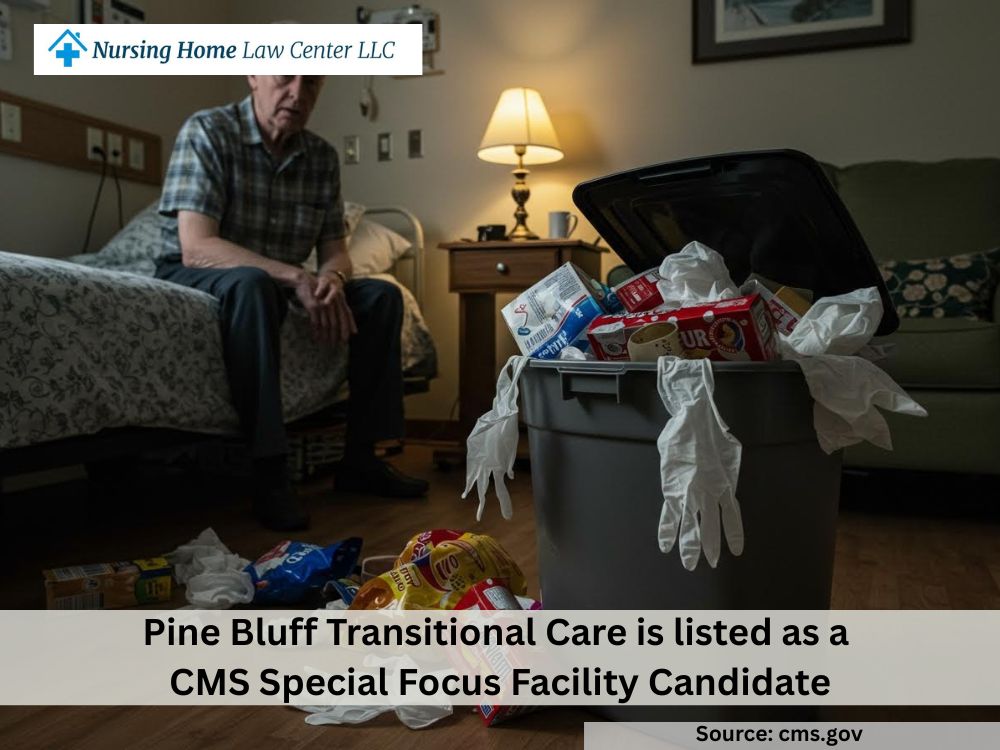
Staffing
Staffing is another area of concern for this special focus facility in Pine Bluff, AR (two stars indicates below-average staffing). Institutions that do not have enough people to provide for the needs of residents are more prone to allegations of abuse, neglect, and actual harm. Here are some current staffing issues at Pine Bluff that are considered serious deficiencies that could cause actual harm to residents:
- 3 hours and 22 minutes of nurse staff hours per resident per day, compared to the state average of 4 hours and the national average of 3 hours and 51 minutes
- 30 minutes of registered nurse hours per resident per day, compared to the national average of 41 minutes
- 37 minutes of licensed practical nurse/licensed vocational nurse hours per resident per day, compared to the state average of 57 minutes and the national average of 52 minutes
- 2 hours and 16 minutes of nurse aide hours per resident per day, compared to the state average of 2 hours and 38 minutes and the national average of 2 hours and 18 minutes
- 3 hours and 2 minutes of nurse staff hours per resident per day on the weekend, compared to 3 hours and 26 minutes statewide and 3 hours and 24 minutes nationally
- 2 minutes of physical therapist staff hours per resident per day, compared to the national average of 4 minutes
Abuse and neglect are common symptoms of an understaffed nursing home. If there are not enough people to care for and supervise patients, it is easier for their needs to go unmet or for abusive individuals to take advantage.
Quality Measures
Quality measures refer to the level of services available in a healthcare institution. In this category, Pine Bluff Transitional Care received a two-star CMS rating, which is considered below average.
There is limited data on deficiencies in short-stay resident programs, but it is worth noting that only 13% of short-stay residents received vaccines to prevent pneumonia. This is much lower than the state rate of 80.8% and the national rate of 81.7%.
More data on the institution’s long-term care programs is available on the CMS website. Here are some of the most concerning deficiencies that demonstrate the nursing home’s serious quality issues:
- 2.40 hospitalizations per 1,000 long-stay resident days, compared to the state rate of 2.01 and the national rate of 1.83
- 6.40 outpatient emergency department visits per 1,000 long-stay resident days, compared to the state average of 2.21 and the national average of 1.78, indicating a pattern of nursing home patient injuries
- 23.1% of long-stay residents received antipsychotic medication, compared to the state average of 10.9% and the national average of 14.5%, demonstrating a failure to implement federal rules on chemical restraints
- 9.7% of long-stay residents experienced pressure ulcers, compared to 5.1% statewide and 5.4% nationally, proving a lack of bed sore prevention in long-term care
- 5% of long-stay residents have had a catheter inserted and left in their bladder, compared to the state average of 1% and the national average of 1.2%, which can increase the risk of nursing home catheter infections
- 17.7% of long-stay residents experienced a diminished ability to walk independently, compared to the state average of 14.7%
- 65% of long-stay residents needed and received a flu shot for the current flu season, compared to the state average of 95% and the national average of 95.3%, raising concerns about infection outbreaks in long-term care facilities
- 2.3% of long-stay residents had symptoms of depression, compared to the state average of 1.5%, indicating a failure to prevent nursing home intimidation and harassment
This long list of deficiencies demonstrates Pine Bluff’s history of failing to provide a high standard of care to its patients. Many of these deficiencies have led to residents experiencing actual harm, neglect, or misconduct, which can have a devastating effect on their physical, emotional, and financial well-being.
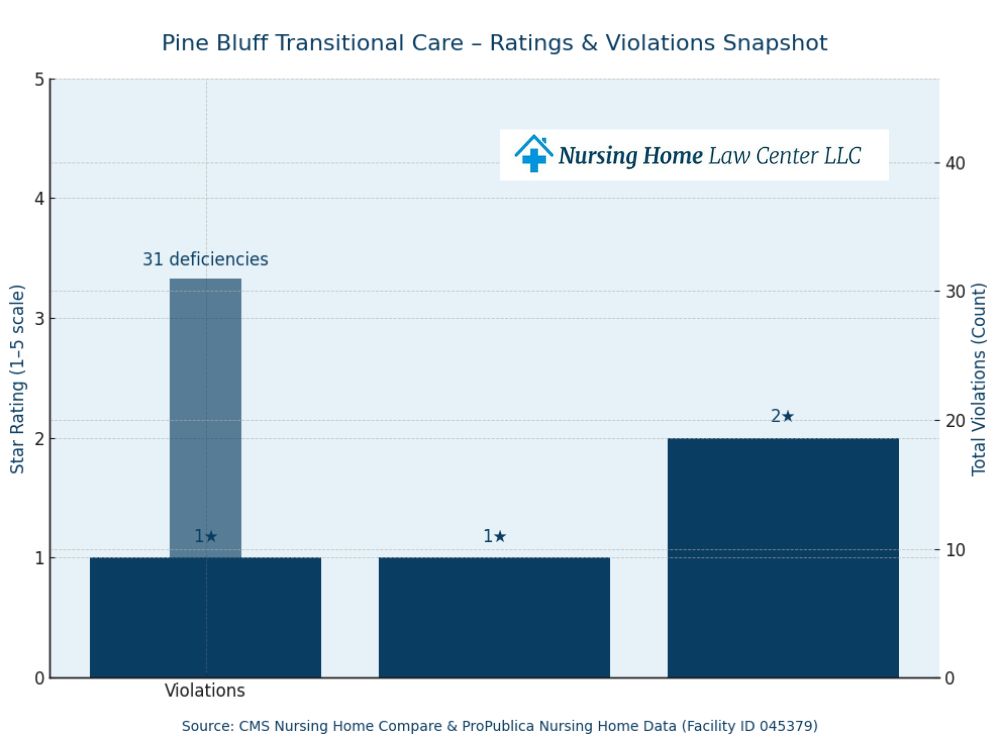
Residents’ Legal Rights Following Abuse or Neglect at Pine Bluff Transitional Care in Pine Bluff, AR 71603
When you become a resident at 6810 South Hazel Street in Pine Bluff, AR, you are granted certain rights by state and federal laws. Governments understand that aging adults are more vulnerable to abuse and neglect, so numerous laws have been passed specifically to protect nursing home residents. Here are some of the most important rights you have as a resident in a nursing institution:
- The right to receive high-quality treatment and support services
- The right to maintain a dignified existence and to be treated with respect
- The right to file an administrative complaint against the institution for misconduct or deficiencies that affect your care
- The right to file a lawsuit for financial compensation against the at-fault parties who cause you actual harm
When these rights are violated, you may have a civil case on your hands. The option to sue ensures victims of abuse or neglect can hold the at-fault parties accountable while seeking appropriate compensation for their suffering.
Legal Damages for Actual Harm in Nursing Facility Lawsuits
While one purpose of a civil lawsuit is to bring the perpetrators to justice so that current deficiencies are corrected, the other primary reason for a claim is to seek a fair settlement. The more actual harm you have suffered, the more likely you are to receive a larger settlement.
Here are some of the legal damages you may qualify for if you are the victim of misconduct or deficiencies at a nursing facility:
- Lost wages – If the abuse or neglect causes injuries that prevent you from working, you can recover lost income from the at-fault parties, including future wages
- Medical expenses – Any costs associated with your diagnosis and treatment may be included in the settlement, including emergency room visits, surgical procedures, medical tests, medication, rehabilitation, and therapy
- Future medical bills – If a medical professional testifies that your care will be ongoing, future medical costs can be included in the claim
- Emotional distress – As a victim of abuse or neglect, you may face psychological challenges, such as depression, anxiety, fearfulness, withdrawal, self-harm, suicide ideation, or Post-Traumatic Stress Disorder
- Pain and suffering – Abuse in a special focus facility candidate, like Pine Bluff Transitional Care, could cause painful physical injuries, which can increase your payout depending on the level of your suffering
- Disability and disfigurement – If actual harm causes permanent alterations to your appearance or abilities, you can claim disability or disfigurement in your lawsuit
- Loss of enjoyment of life – Victims of inadequate services, abuse, or neglect may struggle to find the same joy in life as they did pre-incident
- Punitive damages – Cases involving gross negligence, intentional misconduct, or institutional cover-ups could lead to additional compensation for the victims
An Arkansas nursing home abuse lawyer from our firm can guide you through the legal process to maximize your compensation.
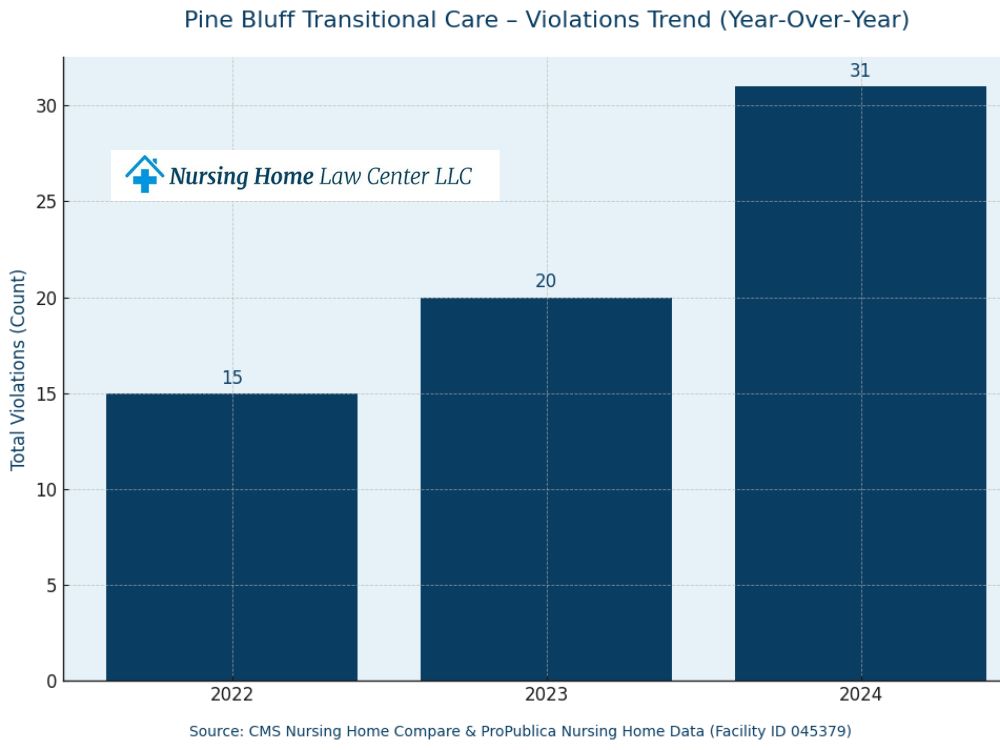
How Nursing Home Law Center Can Help
The Nursing Home Law Center is a team of experienced attorneys who bring a compassionate approach to civil litigation. We understand how to build a strong claim against a facility with a history of deficiencies.
A Pine Bluff nursing home abuse attorney from our team can provide the following legal services:
- Investigating Pine Bluff Transitional Care for negligence
- Gathering evidence of wrongdoing, such as witness statements, surveillance footage, or medical records
- Assessing all legal damages to maximize compensation for victims and families
- Protecting your rights under state and federal laws
- Negotiating with insurance companies for a fair settlement
- Litigating in civil court if necessary.
When you receive legal assistance from our firm, we work on a contingency fee basis. This means you pay nothing unless we secure a favorable outcome. Additionally, you can ask questions about nursing facility deficiencies or the claims process during a free consultation.
If you want to find more information about pursuing lawsuits against nursing institutions, contact us today at 800-926-7565 or complete the online form to schedule your free consultation.

All content undergoes a thorough legal review by our experienced attorneys.
Jonathan Rosenfeld is a leading Chicago nursing home injury lawyer with 25 years of experience focused on elder abuse litigation. Recognized for his dedication, he has received recognition from Illinois Trial Lawyers, Million Dollar Advocates, and Super Lawyers.

